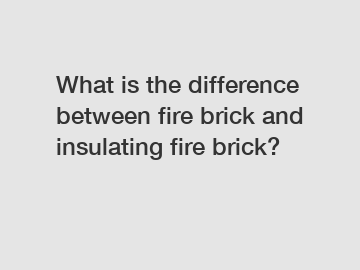What is the difference between fire brick and insulating fire brick?
Fire bricks and insulating fire bricks are both essential materials used in constructing fireplaces, kilns, and furnaces. While they may sound similar, there are distinct differences between the two that are important to understand for anyone working with heat-resistant materials.
First, let's start with fire bricks. Fire bricks are dense, heavy-duty bricks that are designed to withstand high temperatures and harsh environments. They are made from refractory ceramic materials that can withstand temperatures up to 3000°F (1649°C). Fire bricks are typically used in applications where extreme heat is present, such as in industrial furnaces and wood-fired ovens.
One of the main characteristics of fire bricks is their high thermal conductivity, which allows them to absorb and retain heat. This makes them ideal for applications where consistent high temperatures are required. Fire bricks also have a high density, which gives them excellent strength and durability.

On the other hand, insulating fire bricks are designed to have lower thermal conductivity, making them more suitable for applications where heat retention is not as critical. Insulating fire bricks are made from lightweight refractory materials, such as expanded clay or alumina, and are able to withstand temperatures up to 2600°F (1427°C).
The main advantage of insulating fire bricks is their ability to provide better insulation, meaning they can help to reduce heat loss and improve energy efficiency. This makes them ideal for applications where heat conservation is important, such as in the construction of home fireplaces or kilns.
Another key difference between fire bricks and insulating fire bricks is their weight. Fire bricks are typically heavier and denser, while insulating fire bricks are lighter and more porous. This makes insulating fire bricks easier to work with and transport, as well as reducing the overall weight of a construction project.
In terms of cost, fire bricks are generally more expensive than insulating fire bricks due to their higher density and thermal conductivity. However, the choice between the two will ultimately depend on the specific requirements of the project and the level of heat resistance needed.
When it comes to choosing between fire bricks and insulating fire bricks, it's important to consider the intended application and the level of heat resistance required. If you need a material that can withstand extreme temperatures and provide excellent heat retention, then fire bricks are the way to go. However, if you are looking to improve energy efficiency and reduce heat loss, then insulating fire bricks may be the better option.
In conclusion, fire bricks and insulating fire bricks serve different purposes and have distinct characteristics that make them suitable for specific applications. Understanding the differences between the two can help you make an informed decision when selecting materials for your next construction project. Whether you are building a fireplace, kiln, or furnace, choosing the right type of fire brick is essential for ensuring safety, durability, and efficiency. So next time you're in need of heat-resistant materials, remember to consider the differences between fire bricks and insulating fire bricks to make the best choice for your project.
The company is the world’s best castable refractory cement, refractory mortar, high alumina bricks supplier. We are your one-stop shop for all needs. Our staff are highly-specialized and will help you find the product you need.
138
0
0


Comments
All Comments (0)